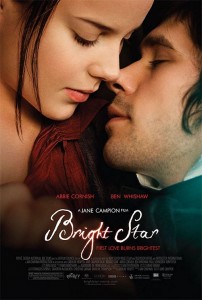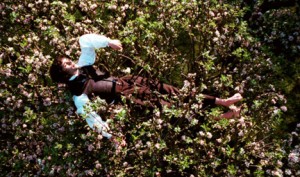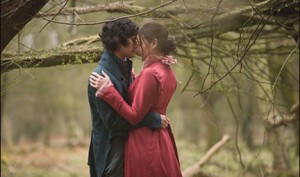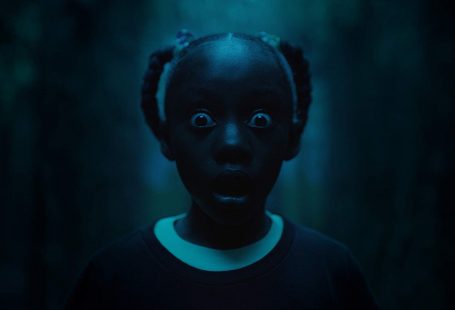 Bright Star is what used to be surefire Masterpiece Theater bait. A serious, deliberate and restrained piece of lushly designed period romance and tragedy. A film where moments and vistas swirl around its centerpiece stars, all managed with a steady and deliberate directorial hand.
Bright Star is what used to be surefire Masterpiece Theater bait. A serious, deliberate and restrained piece of lushly designed period romance and tragedy. A film where moments and vistas swirl around its centerpiece stars, all managed with a steady and deliberate directorial hand.
All said in today’s bombastic, spoon-fed world of cinema… that’s some boring crap. And yet, it’s like comparing Bach to Beatles. Where most mainstream films feel like they’ve got a bouncy hook and melody to bring you along, watching Bright Star feels like listening to classical music. It’s mathematically perfect and hits the right notes, but when compared to hooky, beat-driven pop, it won’t keep everyone awake and engaged. Regardless, Bright Star stands as a delicate and graceful film, but one not to be watched anywhere near bedtime.
 Set in the 19th century twilight of poet John Keats’ life, Bright Star never flounders in its telling of the pre-Victorian love affair between the sober and brilliant poet and his passionate (if in emotion and words only) love affair with his muse Fanny Brawne (Abbie Cornish). Fanny, a sassy seamstress who enjoys male attention as much as rebuffing it, meets Keats (Ben Wishaw) when she, her mother and sisters move next door. Keats and his benefactor pal, Charles Brown (Paul Schneider) spend their days idly musing. Fanny becomes instantly intrigued.
Set in the 19th century twilight of poet John Keats’ life, Bright Star never flounders in its telling of the pre-Victorian love affair between the sober and brilliant poet and his passionate (if in emotion and words only) love affair with his muse Fanny Brawne (Abbie Cornish). Fanny, a sassy seamstress who enjoys male attention as much as rebuffing it, meets Keats (Ben Wishaw) when she, her mother and sisters move next door. Keats and his benefactor pal, Charles Brown (Paul Schneider) spend their days idly musing. Fanny becomes instantly intrigued.
It’s in Brawne’s inspiration that Keats seems to find his most fierce and passionate writing and as he draws closer to her, the more Charles Brown becomes upset. Like any good pal, he sees Keats as an undeniable talent, and finds Brawne a distraction. No matter, Keats and Brawne melt into one another with reckless abandon while painfully aware Keats has no money and can’t afford to marry her. But damn society’s rules! This is loooooove! Still, anyone who’s taken an English history class knows the outcome, as Keats contracts the Tuberculosis that killed both his mother and brother and the bright star inevitably fades away.
 Based on the poem Bright Star, (believed to be Keates’ secret love letter to Fanny) the film succeeds as a deliberative tragedy while bathing in the sensual– not sexual– passion fueled by young love. In fact, Bright Star leaves little to critique beyond perhaps too much emotional restraint by director Jane Campion*. Instead of fully evoking character emotion through earnest dialogue and expression, Campion uses resplendent cinematography to feel it. When Keats finds his muse in Brawne, the film explodes in flowers, sunlight, greenery and sheer impressionistic beauty– Campion matching visually that which Keats wrote.
Based on the poem Bright Star, (believed to be Keates’ secret love letter to Fanny) the film succeeds as a deliberative tragedy while bathing in the sensual– not sexual– passion fueled by young love. In fact, Bright Star leaves little to critique beyond perhaps too much emotional restraint by director Jane Campion*. Instead of fully evoking character emotion through earnest dialogue and expression, Campion uses resplendent cinematography to feel it. When Keats finds his muse in Brawne, the film explodes in flowers, sunlight, greenery and sheer impressionistic beauty– Campion matching visually that which Keats wrote.
If there’s a complaint, it’s that while this dreamy technique works gorgeously on an ethereal level, the style also makes for a cascade-like experience where narrative events flow through the piece but as a result, dramatic beats lose some emotional impact. This may be Campion’s deliberate stab at capturing the numbing deliriousness of new love, but it’s a choice that also masks full audience attachment. Bright Star‘s visual precision leads to a a great deal of undramatic tension. The performances are absolutely solid all the way around, but the manners of the time are so restrained as to sap pulsing emotion from its participants.
 But will anyone care? I suppose that’s a sad commentary on the state of film consumption these days and one that shouldn’t play a part in this review, but such is Bright Star‘s fate. It’s a sublimely beautiful film destined to receive awards consideration for its cinematography, period designs and most notably Abbie Cornish’s performance as the fiery and consumed Fanny Brawne. Yet, Bright Star’s classical DNA portends this craft-laden piece of cinematic China will slip away from greater public consciousness and into the dusty niche of character-driven English period pieces. A niche where for most, viewings can be a beautiful chore.
But will anyone care? I suppose that’s a sad commentary on the state of film consumption these days and one that shouldn’t play a part in this review, but such is Bright Star‘s fate. It’s a sublimely beautiful film destined to receive awards consideration for its cinematography, period designs and most notably Abbie Cornish’s performance as the fiery and consumed Fanny Brawne. Yet, Bright Star’s classical DNA portends this craft-laden piece of cinematic China will slip away from greater public consciousness and into the dusty niche of character-driven English period pieces. A niche where for most, viewings can be a beautiful chore.
*Campion nailed a best Screenplay Oscar in 1994 with The Piano, now more infamously known for launching Anna Paquin’s career and revealing Harvey Keitel’s little pianist.



